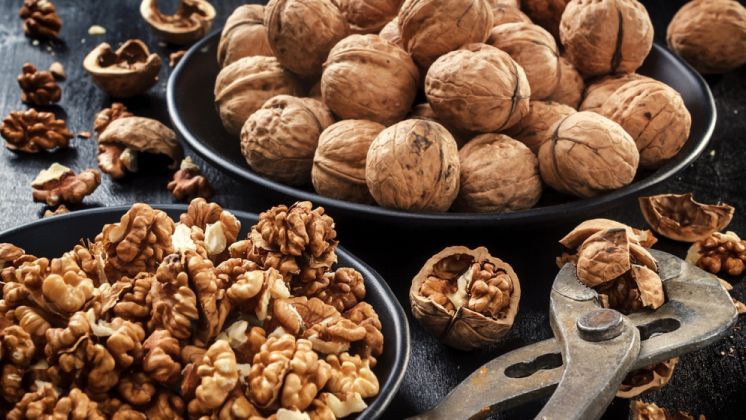Are Walnuts Good For You?
You betcha – just don’t expect them to reverse the ageing process

The cashews are the first to go when people munch through a bag of mixed nuts. That’s a given. After that the almonds and brazil nuts will usually be carefully picked out, leaving a combo of walnuts and hazelnuts. If you approach the bag at this stage you might consider yourself hard done by, but instead focus on the positives – walnuts provide a host of health benefits.
“Walnuts are high in protein and unsaturated fats,” says dietitian Aisling Pigott of the British Dietetic Association.
“There have been some claims and studies to suggests walnuts may reduce cardiovascular risk, but the evidence remains inconclusive. However, we know that nuts are a fabulous source of protein, unsaturated fat, vitamins and minerals.”
Are walnuts good for the brain?
If you pay attention to health columns in the mass media, you might also have noted walnuts’ reported ability to reverse the ageing process. Obviously they aren’t going to turn you into Benjamin Button (who we don’t remember eating a single walnut during the interminable running time of the film) but they could help you age healthily.
“There are some suggestions that walnuts may play a role in healthy brain ageing, but this will require further research,” says Pigott.
Are walnuts healthier than other nuts?
Walnuts have been labelled the healthiest nut in the past. In 2011, scientists from the University of Scranton, Pennsylvania, found that the antioxidants in walnuts were higher in quality and potency than in other nuts. However, Pigott suggests that claiming one nut is better than others is not a useful approach.
“Is an apple ‘healthier’ than a banana? Is a marathon runner ‘healthier’ than a sprinter? Nuts in general have many health benefits, walnuts included,” says Pigott.
Get the Coach Newsletter
Sign up for workout ideas, training advice, reviews of the latest gear and more.
“The nutritional profile of walnuts is different than other nuts’ – it is particularly high in manganese, phosphorus and zinc – but that doesn’t mean it’s better. Variety is key!”
RECOMMENDED: Five Types Of Nut That Should Find Their Way Into Your Diet
Are there any negatives to eating walnuts?
Now we’ve run through the good news, it’s worth checking on if there are any downsides to eating walnuts. Let’s revisit that high unsaturated fat content for starters, because that makes walnuts high in calories.
“As with many nuts they are very calorie-dense,” says Pigott. “It’s easy to munch your way through 100g of walnuts and find that you’ve consumed about 650 calories.”
When picking your walnuts it’s also best to look closely at the nutritional info of the fancier types, which might be showered in salt or covered in chocolate. You’ll burn through your recommended daily calorie intake even quicker if your handful of walnuts is caramelised.

Nick Harris-Fry is a journalist who has been covering health and fitness since 2015. Nick is an avid runner, covering 70-110km a week, which gives him ample opportunity to test a wide range of running shoes and running gear. He is also the chief tester for fitness trackers and running watches, treadmills and exercise bikes, and workout headphones.
